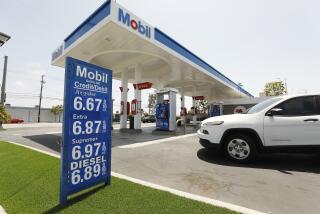Keep stockpiling oil
- Share via
Legislation to halt deposits to the Strategic Petroleum Reserve may be the most popular initiative from Congress this year. But it’s a bad economic bet, bad for national security and gives the American public the false impression that lawmakers are actually doing something about skyrocketing gasoline prices. President Bush should veto the bill -- even though Congress passed legislation by huge margins Tuesday and could actually override his veto.
It may seem logical for the government to try to decrease demand for oil and thus prices by not buying roughly 70,000 barrels a day to deposit in the strategic reserve. In fact, according to the Department of Energy, the amount being stockpiled amounts to just 0.1% of global daily oil consumption. The net effect at U.S. gas pumps of temporarily halting reserve purchases would be close to nil.
One might argue that the effect on America’s ability to withstand an energy crisis is also just about nil. At the moment, the reserve holds about 703 million barrels, enough for about 58 days at current consumption levels. That’s a mighty meager rainy-day larder for a nation as addicted to oil as the United States. And that’s why Congress, in the Energy Policy Act of 2005, directed that the strategic reserve be expanded to 1 billion barrels. That’s still meager, but it would give us a bit more time to respond to a significant interruption of oil supplies.
The most plausible scenario for an oil shock isn’t an embargo, as in 1974, but a decision by Iran to threaten the vital Strait of Hormuz. It’s highly unlikely that Tehran would attempt to close the strait entirely; it knows it would lose an armed confrontation with the U.S. and forfeit export income as well. But in a confrontation over its nuclear program, Iran could certainly rattle its sabers loudly enough to scare oil prices up to stratospheric heights. Under such circumstances, a U.S. president might decide to release some oil into the domestic market to smooth a temporary price spike, just as Bush did after Hurricane Katrina.
The problem is that today’s high gasoline prices probably aren’t very temporary. Oil is at $125 a barrel because of a broad market consensus that supplies will not significantly increase in the near future; that demand from India, China or even U.S. drivers isn’t likely to slump much; and that oil futures are a good hedge against inflation. Even if supplies increase and the dollar strengthens -- and we wouldn’t bet on that -- demand is so insatiable that prices likely won’t fall any time soon. That’s all the more reason for the U.S. to keep stockpiling reserves.
More to Read
Sign up for Essential California
The most important California stories and recommendations in your inbox every morning.
You may occasionally receive promotional content from the Los Angeles Times.













